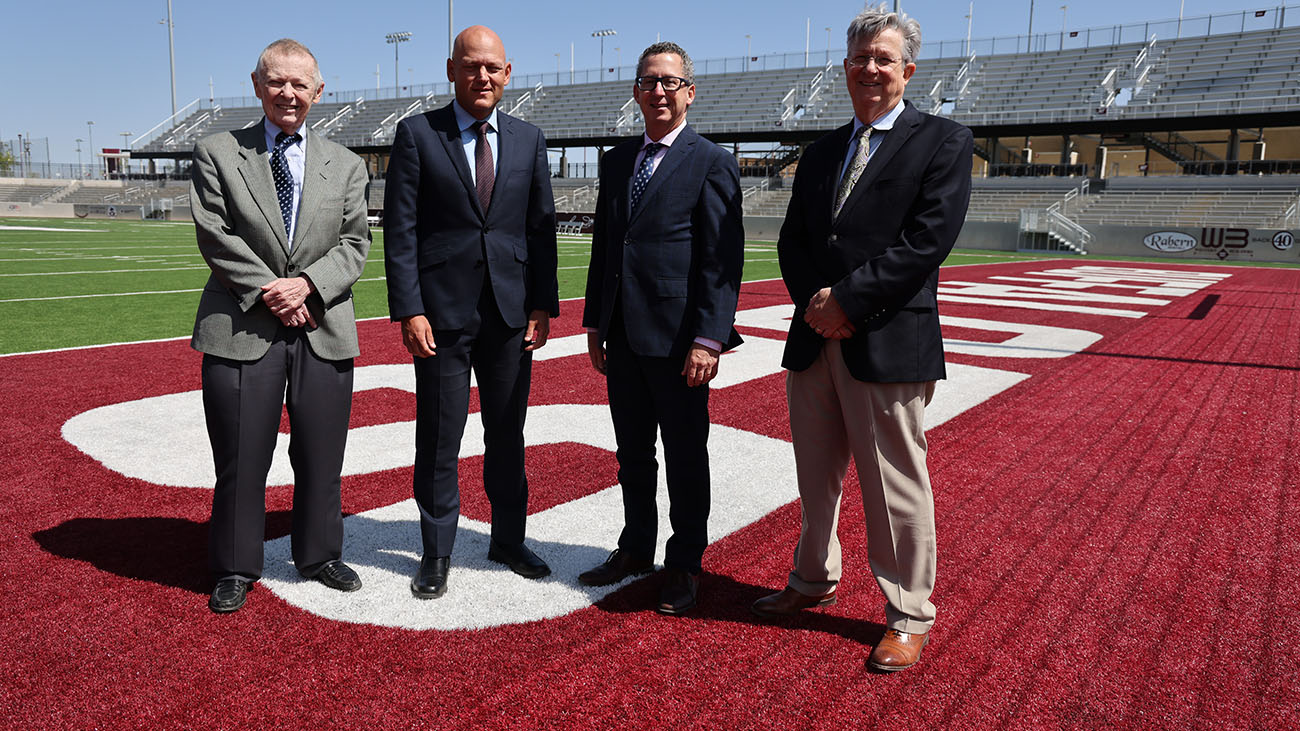- Community
- Alumni
- Arts
The West Texan: Passing the Baton

Photo: This article originally appeared in the Fall '21 issue of The West Texan. Click the image to read the entire issue.
In its 104-year history, the West Texas A&M University Marching Band has led by only eight directors — and four of them, thankfully, are still with us. Three, in fact, still teach classes at WT.
That’s a remarkable legacy, one that was celebrated this fall during a special lunch in the Fairly Group Club at Buffalo Stadium with Dr. Gary Garner, Dr. Don Lefevre, Dr. Russ Teweleit and Dr. B.J. Brooks shortly after Brooks took the baton as WT’s newest marching band director.
Their conversation, edited for length and clarity, follows.
Chip Chandler: Okay, well, let me just start with Dr. Garner and tell me what was the marching band like when you arrived. Let's start from your arrival at WT.
Garner: My first year, the talent range was pretty wide. There were some extraordinary players, but the band primarily was made up of non-music majors. And some of them were considerably less than extraordinary. But they were all very committed to the organization and what they were doing.
Chandler: What brought you here?
Garner: The opportunity to come back to Texas. I'd been the marching band director at University of Southern California for four years.
Chandler: Why go from USC to WT?
Garner: It wasn't in Texas, but you know that already. The marching band scene in California at that time was not remotely what it was in Texas. And I missed that greatly.
Chandler (to Lefevre, Teweleit and Brooks): Tell me about your earliest memories of Dr. Garner?
Lefevre: I started coming to the WT band camp in the, I guess, early ’70s. And Dr. Garner was always the conductor of the honors band at that time. Then I came to WT as a student in 1975 from Fort Stockton. And surprisingly enough, there were a ton of students that were attended WT from Fort Stockton because our high school band director was such a big believer in Dr. Garner.
Garner: And I might interject, if I may, that the band camp then and now and every year in between has been probably the single biggest factor that has brought a lot of extraordinarily talented band members to this campus.
Lefevre: I have to say, you know, we talk about with all my friends, a lot of our alumni, we talk about the ’70s. And the ’70s were an amazing time and WT in the Department of Music. Oh my goodness, the talent level was extraordinary. And the marching band was unreal. I'll never forget the way it sounded.
Garner: If I could relive one decade of my life, it would be the ’70s.
Lefevre: I mean, we're going to recapture that again, I hope, but I think the ’70s were probably the highlight of things in the School of Music in terms of just the quality of students.
Chandler: Russ, when do you hear that the ’70s were the best decade, how does that make an ’80s child feel?
Teweleit: I'm okay with that. It didn't hurt that they had the Vietnam War, sending them all to college. College became very attractive at that point. But yeah, I came to camp just for no reason other than my friend needed a roommate. I didn't know anything about WT until then, but I feel like I came to camp and never left. I came here as a music major in the fall of ’86. I graduated, moved two blocks and taught in Canyon for eight years, and then came back to WT and have been here since 1989.
Chandler: What was the reputation of this band?
Lefevre: I think we all felt like Dr. Garner was the very best in the country at what he did. And he had no equal. Really, when you when you listen to those performances, and all of us do, the band played at a higher level than any other university band in the country.
Garner: Do you see how his nose is growing?
Lefevre: No, it really did. And, I mean, we could tell you stories.

Photo: Former West Texas A&M University marching band directors Dr. Gary Garner, left, Dr. Don LeFevre and Dr. Russ Teweleit, right, share memories with the newest director, Dr. B.J. Brooks, second from right.
Brooks: I can tell you a little bit about how reputation works. I think was my first year here (in the master’s program) in 2002. I took conducting from Lefevre. And first thing that we did in class, I remember that, we watched a video of Dr. Garner conducting ‘Lincolnshire Posey,’ and Don said, ‘Now watch this, watch this,’ talking about all of the subtle variation of the baton that could invoke a really musical response from the students and not doing more than is necessary, not doing anything showy, but doing what the music demands. (I thought) this Dr. Garner must be somebody, you know, to be able to pass these words of wisdom to people that I admire and respect. That meant something. That, to me, is what reputation is. It's not the firsthand thing, it's the second- and then thirdhand comments from people.
Garner: Even though he is highly prone to exaggeration, this guy is a certifiable genius, let me tell you.
Lefevre: So Garner was the fifth band director at WT. BJ is the eighth since 1917.
Chandler: Is that unusual? It seems it to me.
Lefevre: Oh, yeah. A lot of it is (Garner’s) long tenure. He was the marching band director for 30 years — 1963 to 1993. Yeah, that's a long haul.
Chandler: In 30 years as the marching band director, how many lives do you think he touched? What's his legacy?
Lefevre: Well, this next year, we're having a Garner tribute — June 10 through 12 in the Amarillo Civic Center. It's going to be a neat event. Seven decades and, I don't know, maybe 8,000 students during that time probably that went through the School of Music. Here’s the thing about Gary. He retired in 2002, but he’s still involved. He’s still working at the band camp.
Garner: You’ve never seen the floors any cleaner, let me tell you. (All laugh.)
Lefevre: He’s still a part of what we do. He hasn’t ever not been. That's the great thing about him being local and healthy, you know? All he charges is the price of a Diet Dr. Pepper.
Chandler: BJ, what's it like to step into the footprints left by these men?
Brooks: Well, you know, it was a big decision. You look at the longevity of these directors and the commitment of these directors, it’s certainly no small task. I talked to my wife about it and said you know, I don't want to do it for a year or five years, you know. It's bigger than that.
Chandler: Y'all know I love marching bands, too. What makes marching band so special? What makes it such a valuable experience for students who don't even go on in music?
Brooks: I’ve got this one. It's so uniquely American to have a marching band, certainly the way that we do it. And I'm not sure what it is particular, but the idea of putting a visual on top of the music. The visual, but also athletic performance, on top of the music.

Photo:Dr. Gary Garner
Garner: Without any concussions.
Brooks: Rare concussions, very rare. (Laughter) It's a bonding experience. You can have similar experiences in ensembles, but, I don't know, when you sweat together, you start to become very close.
Lefevre: It creates an esprit de corps that you don’t get in any other musical activity to that degree.
Brooks: If ever there was a team activity, it would be band. Everybody marches. And everybody has to do it together. And if you see somebody who's slightly slower, it's not like we're going to bench them. They're going to learn it. And they're going to be better for it.
Lefevre: I was talking to one of our alumni and we were visiting about the whole WT experience and what makes our alumni so close and so tightknit. We think it's the marching band, this experience that we’ve all shared.
Brooks: You had asked a while ago, you know, stepping in and doing this, how do does that feel? Once Russ had announced he was stepping down, seeing the flood of posts, saying, you did this for me, this changed my life, I'll always remember this. Just student after student after student after student. It's a big deal.
Chandler: Russ, what was it like to make that decision to step down this year?
Teweleit: Oh, it was really hard. BJ and I talked about it two years ago, and that gave me all the comfort knowing that it would be in good hands. I decided 30 years of marching band was enough. I thought this would allow me to put a little more focus into the music education area, which is what I do. The time seemed right for that.
Lefevre: It's a full-time job just by itself. Just that one thing. You could do marching band and if that could be your entire job for the whole fall semester, you'd still be one of the busiest people at the School of Music, at the university. It's a hard job.
Garner: But a very rewarding one.
Teweleit: The connection and impact you have on them is so incredible.
Chandler: Anything else? That was kind of a perfect ending.
Garner: Next time, could you find us a better parking place?

